Discover The Simplicity Parenting Podcast with Kim John Payne
The Simplicity Parenting Podcast with Kim John Payne

The Simplicity Parenting Podcast with Kim John Payne
Author: Kim John Payne/Center for Social Sustainability
Subscribed: 1,043Played: 37,649Subscribe
Share
© 2026 Copyright 2022 The Simplicity Parenting Podcast with Kim John Payne
Description
Weekly insights on children and parenting from Simplicity Parenting author Kim John Payne.
292 Episodes
Reverse
In this episode, Kim John Payne explores how families can navigate changes in rhythms while still preserving the security that predictability provides. He explains that when a regular caregiver is unavailable for bath time or bedtime, previewing the change earlier in the day helps a child take it in and prepare. By letting a child know at breakfast or lunch what will be different that evening, parents give them time to adjust rather than springing a surprise at the last moment.
Kim highlights the value of micro rhythms (the small "and then" steps that make up a routine) because when children know exactly how something goes, they can guide another caregiver through it with confidence. This sense of agency transforms the child from a passive participant into someone who feels ownership over their world. The same principle applies when handing routines to babysitters or grandparents: written steps and a child who knows the drill makes everyone feel more capable and reduces disruption. Kim encourages parents to invite children to show what comes next, letting them self-navigate through familiar sequences and take pride in their competence
🏠 Simple Family Living
📑 Simplicity Parenting Starter Kit
📲 Request a Consultation with Kim John Payne
📚 Simplicity Parenting Book Store
In this episode, Kim John Payne explores how small, repeated household rituals build both motor skills and a sense of competency in children. He explains that micro rhythms (the little "hows" of daily life like setting the table, clearing dishes, or preparing for bath time) create more than just predictability and safety. When children perform these tasks in the same way over and over, they develop fine and gross motor skills while establishing neural pathways that support learning and coordination. Kim emphasizes that this repetition also builds proprioception, helping children understand where they are in space.
Beyond the physical benefits, rhythmical home care gives children a profound sense of agency and accomplishment in a world where they have limited control. By doing these small tasks independently and successfully, children develop the confidence that comes from knowing "I can do this." Kim encourages parents to see these micro rhythms not as chores but as opportunities to kindle competency that will serve children throughout their lives.
📓Simplicity Parenting Family Life Care Professionals Seminar
🍎 Simplicity Parenting Coach Training
📑 Simplicity Parenting Starter Kit
📲 Request a Consultation with Kim John Payne
In this monthly episode of Simplicity Parenting, Kim John Payne explores the difference between asking children to say sorry and helping them genuinely make things right. While acknowledging that saying sorry has value, Kim cautions against forcing apologies, which often leads to defensiveness, shame, or empty words. Instead, he invites parents to look beneath the apology and focus on what truly matters: a child recognizing that something crossed a family value and taking responsibility in a way that feels real and restorative. When children feel pressured or shamed, Kim explains, they are far more likely to deny or resist rather than reflect.
Kim introduces the idea of “doing sorry” as an alternative and often more meaningful path. This might include repairing harm through actions, offering something meaningful to the other child, or simply showing genuine remorse through presence and emotion. He describes three forms of apology: saying sorry, feeling sorry, and doing sorry, and emphasizes that any combination of these can be appropriate. By giving children time to calm down and guiding them gently toward repair, parents help them develop empathy and accountability without humiliation. The episode reminds listeners that true reconciliation grows from connection, not coercion.
🏠 Simple Family Living
📑 Simplicity Parenting Starter Kit
📲 Request a Consultation with Kim John Payne
📚 Simplicity Parenting Book Store
In this episode, Kim John Payne explores how parents can set clear, loving boundaries in ways that truly reach their children. He explains that when we slow our speech and lower our tone, children are better able to process what we say and feel our calm authority. Speaking slowly helps a message land without repetition, and a lower, grounded voice communicates steadiness and care rather than frustration. Kim encourages parents to “inhabit” the no, to let it come from a calm, centered place rather than from irritation or haste.
He describes how children’s mirror neurons naturally respond to the energy and posture of the adult in front of them. When parents slow down, breathe, and settle their bodies, children follow that movement toward calm and security. A firm “no” delivered with warmth and confidence helps a child feel safe, even if they do not like the limit in the moment. Kim closes the episode by announcing the launch of Simple Family Living, a new online platform offering workshops, guided parenting journeys, and a full, searchable archive of Simplicity Parenting themes.
🏠 Simple Family Living
❤️ Support the Podcast
📑 Simplicity Parenting Starter Kit
📲 Request a Consultation with Kim John Payne
📚 Simplicity Parenting Book Store
In this final part of the five-part Emotionally Resilient Tweens and Teens series, Kim John Payne concludes “Annika’s Story,” the true account of a middle school girl learning to reclaim her sense of self after a painful fall from popularity. Following the cheating incident and the loss of her so-called friends, Annika faces deep loneliness and the sting of exclusion. Yet in the quiet of that isolation, she begins to rediscover who she really is. With the gentle support of her former friend Danielle and a new ally, Skylar, Annika learns that real belonging comes from honesty, kindness, and being true to herself.Kim reflects on how these experiences mirror what so many young people face when trying to fit in, how easily self-worth can become tangled in social approval, and how freeing it is when they realize they can simply be themselves. The story closes on a hopeful note, reminding listeners that even painful moments of loss can become the ground where genuine confidence and connection take root.
❤️ Support the Podcast
📑 Simplicity Parenting Starter Kit
📲 Request a Consultation with Kim John Payne
📚 Simplicity Parenting Book Store
In this fourth part of the five-part Emotionally Resilient Tweens and Teens series, Kim John Payne continues reading from “Annika’s Story,” following the seventh grader as she becomes more deeply entangled in her desire to fit in with the popular group. When Annika’s mother unexpectedly sees her dressed in a way that reflects the influence of her new friends, Annika experiences a moment of painful self-awareness. Her mother’s silent disapproval becomes a mirror that reveals how much she has changed, and Annika begins to feel the discomfort of living out of alignment with who she truly is.As the story unfolds, Annika’s need for acceptance draws her into increasingly compromising situations, culminating in a serious lapse in judgment that threatens her integrity and reputation. Kim reflects on how these moments, though painful, can become turning points in a young person’s development if they are met with guidance, patience, and understanding rather than judgment. He reminds listeners that this kind of steady support is at the heart of the Emotionally Resilient Tweens and Teens Care Professionals Seminar, which helps parents and educators strengthen the confidence and self-awareness children need to stay true to themselves.
🍎 Simplicity Parenting Coach Training
📓Emotionally Resilient Tweens & Teens Care Professionals Seminar
❤️ Support the Podcast
📑 Simplicity Parenting Starter Kit
📲 Request a Consultation with Kim John Payne
📚 Simplicity Parenting Book Store
In this third part of the five-part series on Emotionally Resilient Tweens and Teens, Kim John Payne reads aloud “Annika’s Story” from the book he co-authored with Luis Fernando Llosa. The story follows Annika, a seventh grader who moves to a new school and struggles with the temptation to change herself to fit in with a popular group. At first she is thrilled to be included, but little by little she begins to lose touch with who she really is, her confidence, her interests, and her natural kindness.
Through Annika’s experience, Kim reflects on how easily children can give up too much of themselves for acceptance and how important it is for parents and educators to help them stay connected to their authentic selves. He reminds listeners that belonging should never come at the cost of identity and that caring adults can gently guide children back to their center when they start to drift. Kim also shares that this theme is at the heart of the Emotionally Resilient Tweens and Teens Care Professionals Seminar, which helps professionals support families in building true confidence and social resilience.
🍎 Simplicity Parenting Coach Training
📓Emotionally Resilient Tweens & Teens Care Professionals Seminar
❤️ Support the Podcast
📑 Simplicity Parenting Starter Kit
📲 Request a Consultation with Kim John Payne
📚 Simplicity Parenting Book Store
In this second part of the five-part series on Emotionally Resilient Tweens and Teens, Kim John Payne continues exploring how parents can guide children through difficult social experiences. Drawing from Chapter Four of the book, he focuses on helping children understand their emotional reactivity when they are teased or excluded. Through the story of a boy named Tony, Kim illustrates how teasing often continues not because of a child’s shortcomings, but because strong reactions feed the behavior of the child teasing them. He explains that when children learn to stay centered, they reclaim their power and reduce the payoff for those who provoke them.
Kim offers practical ways for parents to teach this skill, such as practicing calm reactions at home, planning responses together, and sometimes even using humor to defuse tension. He also acknowledges how painful it can be for children to face these truths and encourages parents to provide reassurance and hope while keeping conversations short, natural, and consistent. Even when children push back or claim they already know what to do, Kim reminds parents to stay close and emotionally steady. The heart of this episode is a message of perseverance. Children to find confidence and strength within themselves, one small step at a time.
🍎 Simplicity Parenting Coach Training
📓Emotionally Resilient Tweens & Teens Care Professionals Seminar
❤️ Support the Podcast
📑 Simplicity Parenting Starter Kit
📲 Request a Consultation with Kim John Payne
📚 Simplicity Parenting Book Store
This episode is the first in a five-part series drawn from Kim John Payne’s book Emotionally Resilient Tweens and Teens, co-authored with Luis Fernando Llosa. As part of the lead-up to his upcoming Emotionally Resilient Tweens & Teens Care Professionals Seminar, Kim begins by exploring how parents can respond when their child is socially struggling, feeling excluded, teased, or left out. He reminds us that every child experiences this at some point and that how we respond can make a lasting difference.
He then reads Anika’s Story, from the Ten Story Tool Box in the book. Anika recounts a situation in her middle school years where she gave up too much of herself to fit in the the popular kids, how she came to understand that her morally guided, “inside voice” was not matching the “outside actions” of what her peers were doing. She navigates this tricky path and finds her way to finding true friendship.
This series will continue in the weeks ahead, guiding parents through conversations about reactivity, empathy, and emotional steadiness. Together, the five parts form a practical and compassionate roadmap for helping children build confidence and resilience in their social worlds.
🍎 Simplicity Parenting Coach Training
📓Emotionally Resilient Tweens & Teens Care Professionals Seminar
❤️ Support the Podcast
📑 Simplicity Parenting Starter Kit
📲 Request a Consultation with Kim John Payne
📚 Simplicity Parenting Book Store
In the final part of their conversation, Kim and Dr. Freed shift from exposing the harms of persuasive technology to offering practical solutions. Kim introduces the idea of “four connections” as a foundation for a healthy childhood: connection to nature, to friends through real play, to family, and to one’s inner self. Dr. Freed emphasizes the importance of building community among parents and resisting screen culture together. They highlight resources like Kids, Brains, and Screens by Melanie Hempe and Reset Your Child’s Brain by Dr. Victoria Dunckley, as tools to help families go low or no screen. The episode includes inspiring examples of families replacing screen time with rituals like Friday family nights and creative play. Dr. Freed shares personal stories about parenting without screens and the long-term benefits he has seen in his daughters. The conversation ends with hope and encouragement: that raising children in a humanized, connected environment not only helps them thrive but also fosters qualities that others naturally seek out—empathy, presence, and resilience.
❤️ Support the Podcast
📑 Simplicity Parenting Starter Kit
📲 Request a Consultation with Kim John Payne
📚 Simplicity Parenting Book Store
In the second installment of their conversation, Kim and Dr. Freed take a deeper look at how powerful interests influence public understanding of screens, particularly through organizations that claim to promote children's health. Dr. Freed describes what he calls the “Silicon Valley exception,” where major health bodies are either aligned with or funded by the tech industry, much like tobacco-funded health research decades ago. They examine the contradiction between what parents instinctively know—that screen immersion harms connection, learning, and wellbeing—and what schools and media often promote. Kim shares a revealing story about comparing the pace and editing of Mr. Rogers’ programming to modern children's shows, illustrating the intense sensory stimulation that now defines children's media. They also identify common myths, such as the belief that teenagers need peers more than parents, and expose how these narratives are used to weaken parental influence. The episode ends with a preview of the next conversation, which will focus on what families can actually do in response.
❤️ Support the Podcast
📑 Simplicity Parenting Starter Kit
📲 Request a Consultation with Kim John Payne
📚 Simplicity Parenting Book Store
In this first part of a three-part fire side style chat, Kim John Payne speaks with leading psychologist Dr. Richard Freed about the growing influence of persuasive design in modern digital technology. Dr. Freed shares how screen-based platforms, especially social media and video games, are intentionally engineered to hijack attention and foster dependency, using principles drawn directly from behavioral psychology. He warns that these technologies are designed not just to entertain, but to profit from manipulating children’s behavior. The conversation compares today’s screen culture to the tobacco industry of the past, noting how psychological techniques are used to override parental authority and reshape childhood itself. Kim and Dr. Freed discuss the deep concern that many parents feel, even when they can’t fully articulate it, and they affirm that this intuition is valid. They explore how tech companies use parents’ fears and children’s vulnerabilities as tools for marketing and control, and they call for greater awareness and resistance to these manipulations.
❤️ Support the Podcast
📑 Simplicity Parenting Starter Kit
📲 Request a Consultation with Kim John Payne
📚 Simplicity Parenting Book Store
In this episode, Kim highlights the importance of previewing and “getting out ahead” of difficult moments before they escalate. Whether it’s a grumpy morning with a young child or a teenager returning home with restraint collapse, acknowledging the emotional state early can shift the tone of the day. Rather than ignoring frustration or trying to immediately fix it, Kim encourages parents to calmly name what they see and reassure their child that they are present and supportive. This approach signals safety and understanding, and it helps children feel less alone in their struggles. For teens, he suggests offering flexibility and emotional space, even letting them opt out of dinner or homework when they clearly need to decompress. Asking, “Let me know what you need,” empowers older children and shows trust. These small, anticipatory gestures build connection and trust over time and prevent many conflicts from growing larger.
❤️ Support the Podcast
📑 Simplicity Parenting Starter Kit
📲 Request a Consultation with Kim John Payne
📚 Simplicity Parenting Book Store
Kim addresses the common parenting dilemma of whether to correct a child’s behavior or let it go. He gently challenges the popular idea of “choosing your battles,” suggesting that framing these moments as battles may not serve the relationship. Instead, he invites parents to see each behavior—no matter how small—as a moment to define family values and build connection. The key, he says, is not whether to correct, but when and how. Small corrections delivered calmly in the moment can prevent larger issues from forming. Kim emphasizes that if we ignore repeated missteps, they may accumulate into bigger breakdowns later. He suggests that a brief, gentle acknowledgment such as, “That’s not okay, we’ll talk about it later,” can hold a boundary while maintaining connection. These micro-moments, when handled thoughtfully, help children understand what is acceptable and create an atmosphere of mutual respect.
❤️ Support the Podcast
📑 Simplicity Parenting Starter Kit
📲 Request a Consultation with Kim John Payne
📚 Simplicity Parenting Book Store
In the final part of this five-part series on emotional self-regulation, Kim John Payne explores the idea that when children are angry, they are also deeply vulnerable. He reminds us that difficult behaviors often surface when children are overwhelmed, and in those moments, they are not only reactive but also scanning closely for how we respond. Kim uses the image of a “direct conduit” opening up between parent and child—a brief window of pure connection, even if it is born from challenge rather than joy. He encourages parents to recognize that beneath the testing behavior is a child who is emotionally bare and in need of orientation and support. If parents can remain centered and responsive rather than reactive, these moments can become micro-definitions of the parent-child relationship. Kim compares emotional vulnerability during conflict to a child with a physical fever: both states reveal a need for care and co-regulation. Being present, steady, and attuned during emotional “soul fevers” helps children feel held, no matter their age.
❤️ Support the Podcast
📑 Simplicity Parenting Starter Kit
📲 Request a Consultation with Kim John Payne
📚 Simplicity Parenting Book Store
In this fourth part of this five-part series on emotional self-regulation, Kim John Payne reviews how screens can disrupt not only a child’s emotional balance but also a parent’s ability to stay centered. He explains how modern screen content is designed to deliver high levels of dopamine, adrenaline, and cortisol, making it both addictive and delivering big hits of easily gained reward and pleasure. When a screen is taken away, a child may feel as if their source of safety has been removed, leading to intense reactions. In these moments, parents can quickly shift from being seen as protectors to being perceived as threats. This reversal can be emotionally difficult and is one of the most common situations where parents find themselves losing their cool. Kim urges listeners to recognize that this is not the child’s fault, but rather a consequence of how screens are designed. He suggests that the best way to reduce daily flare-ups and refusals is to significantly reduce screen exposure. This is not about blame but about understanding the biological and emotional setup that screens create. When we reduce that setup, we give ourselves a much better chance to remain calm, connected, and clear in our family rhythms.
🍎 Simplicity Parenting Coach Training
📓 Being At Your Best Care Professionals Seminar
❤️ Support the Podcast
📑 Simplicity Parenting Starter Kit
📲 Request a Consultation with Kim John Payne
📚 Simplicity Parenting Book Store
In the third episode of this five-part series on Emotional Self-Regulation, Kim John Payne offers a practical, compassionate invitation to slow down. He introduces the metaphor of a tap overflowing, a symbol for the mounting pressures and over-commitments many families face. Instead of constantly mopping up emotional “spillage,” Kim encourages parents to reflect on what’s truly essential and gently let go of what isn’t. By thoughtfully simplifying the weekly schedule, families can reduce overwhelm and create the emotional space needed to respond with steadiness rather than stress. This episode is a gentle reminder that doing less can often mean connecting more.
🍎 Simplicity Parenting Coach Training
📓 Being At Your Best Care Professionals Seminar
❤️ Support the Podcast
📑 Simplicity Parenting Starter Kit
📲 Request a Consultation with Kim John Payne
📚 Simplicity Parenting Book Store
In the second of this five-part series on Emotional Self-Regulation, Kim John Payne explores one of the deepest challenges for parents: the feeling of being unseen, undervalued, or taken for granted. These emotional triggers can quietly build up, leading to reactive moments that feel disproportionate but are actually the result of accumulated strain. Kim gently encourages parents to take stock of what pushes their buttons - not to judge themselves, but to notice and name the patterns. When combined with small, regular acts of self-care, this awareness becomes the trailhead toward healthier family dynamics and more grounded parenting.
🍎 Simplicity Parenting Coach Training
📓 Being At Your Best Care Professionals Seminar
❤️ Support the Podcast
📑 Simplicity Parenting Starter Kit
📲 Request a Consultation with Kim John Payne
📚 Simplicity Parenting Book Store
In the first of a five-part series on Emotional Self-Regulation, Kim John Payne reflects on the quiet power of micro self-care - small, intentional moments that help parents replenish their emotional reserves. He shares how the early demands of parenting often push self-care to the margins, yet carving out even brief pauses to do something nourishing can build a foundation for greater resilience. Whether it’s a mindful walk, a short moment with a book, or simply sitting with a cup of tea, these gentle rituals can grow over time and help us stay emotionally steady amidst the ups and downs of family life. Kim reminds us that caring for ourselves is not selfish, but essential to being present and attuned with our children.
🍎 Simplicity Parenting Coach Training
📓 Being At Your Best Care Professionals Seminar
❤️ Support the Podcast
📑 Simplicity Parenting Starter Kit
📲 Request a Consultation with Kim John Payne
📚 Simplicity Parenting Book Store
In this episode, Kim John Payne explores the importance of helping children learn to delay their requests and respect the timing of others. Rather than always responding immediately or brushing kids off with a vague “in a minute,” Kim encourages parents to offer clear, specific guidance on when they can give their full attention. He offers practical phrases and techniques for children of different ages, emphasizing that this approach builds impulse control and sets children up for success in relationships and group settings. By modeling respectful timing and consistently circling back, parents teach their children patience, empathy, and how to be part of a larger family rhythm.
❤️ Support the Podcast
📑 Simplicity Parenting Starter Kit
📲 Request a Consultation with Kim John Payne
📚 Simplicity Parenting Book Store





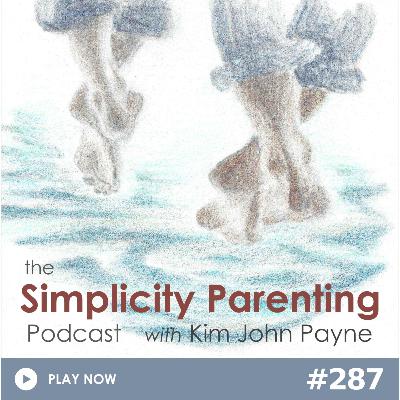
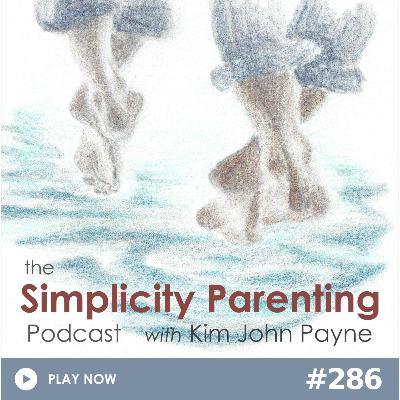
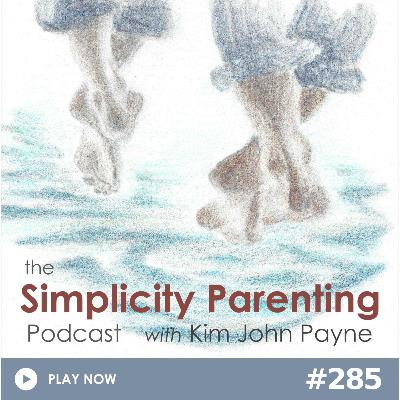
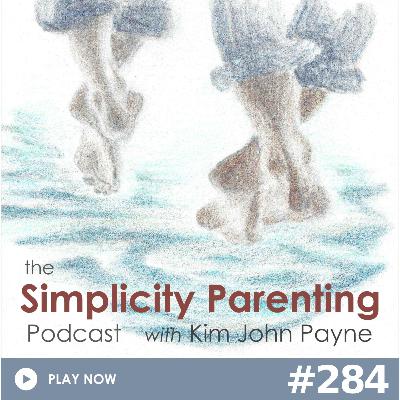
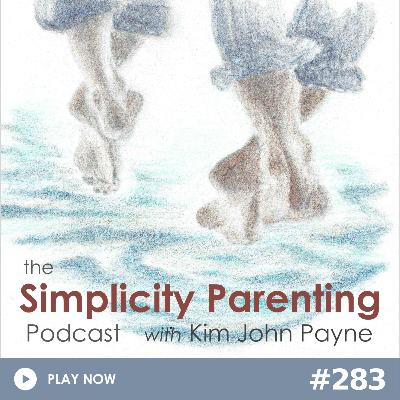
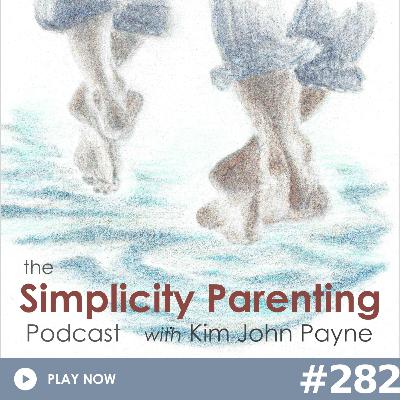
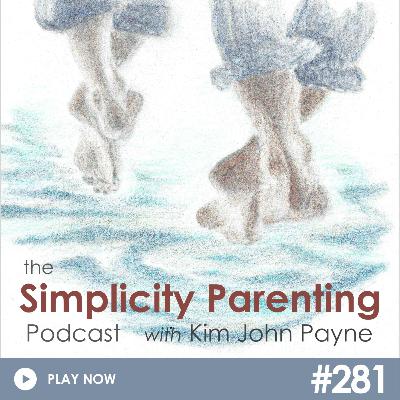
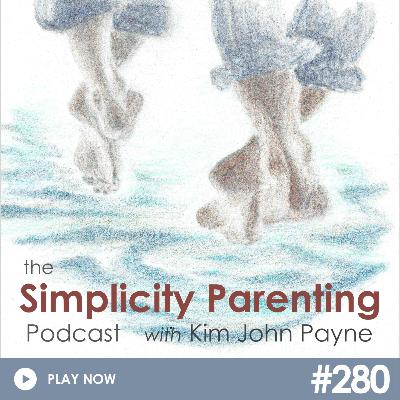
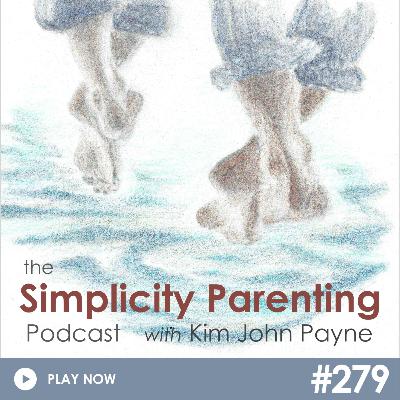
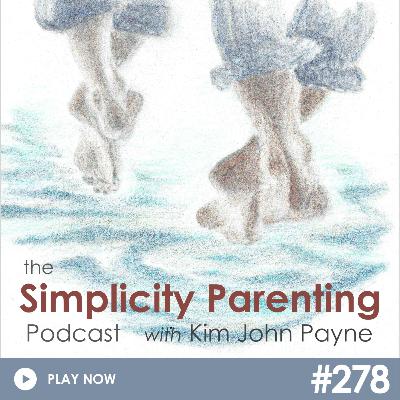
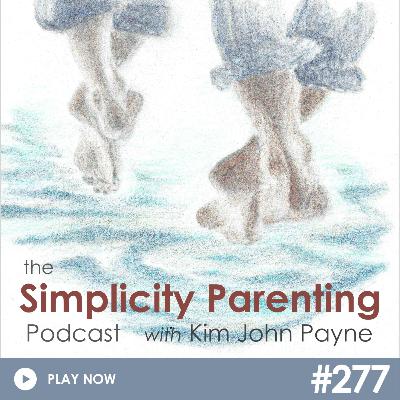
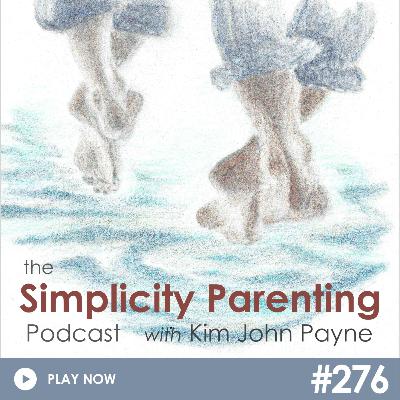
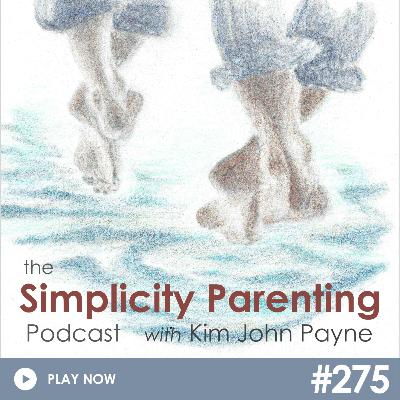
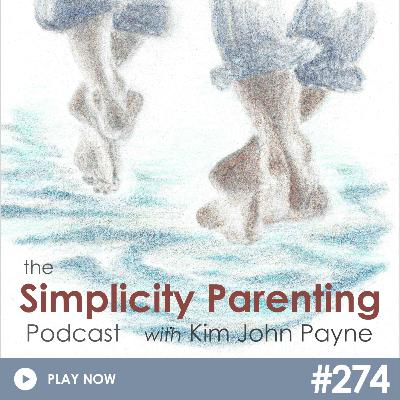
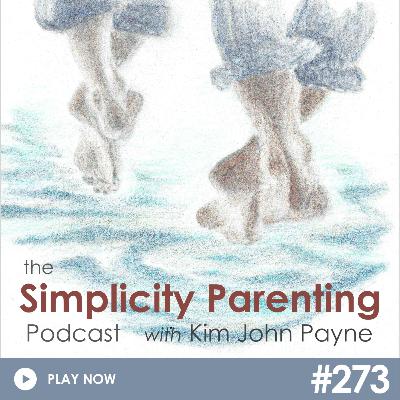
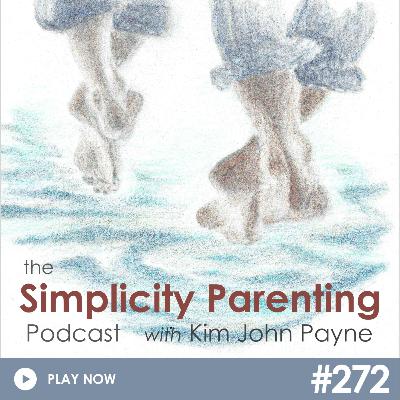
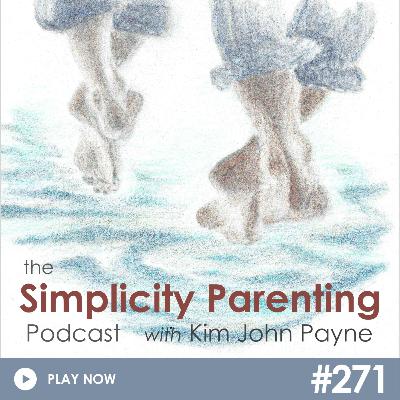



Fantastic Kim! Greetings from Brazil!
I love Kim's podcasts but I'm not sure why these gun play sets are only about boys. girls do the same things. many parents may skip over these and miss the message because it cuts out genders from the discussion, quite wrongly.
I'm so glad you've created this podcast! great reminders